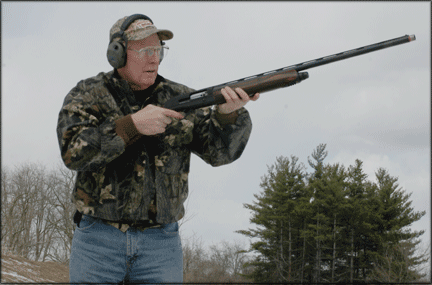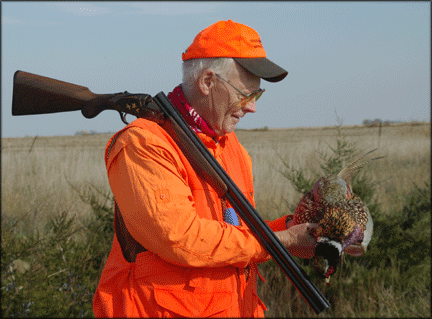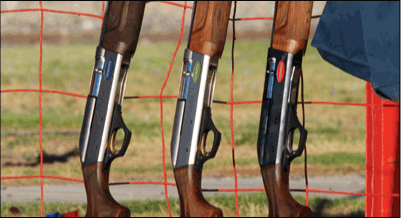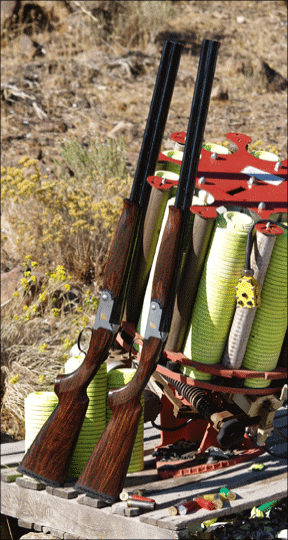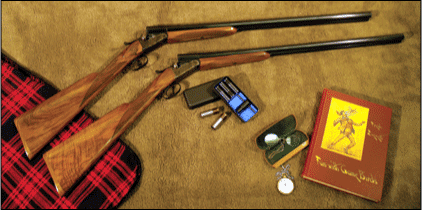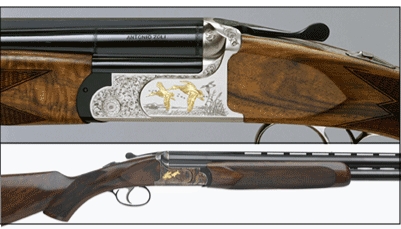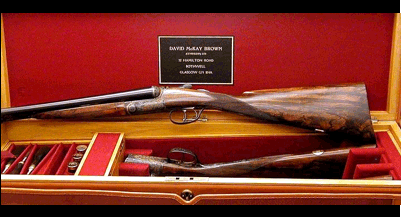We’ve witnessed the revival of shotgun legends in recent years, but based on our field tests of the three new Veronas, none have combined the affordability, reliability and performance as these Italian workhorses.
The resurgence of cherished shotgun brands has been most active in the over $10,000 market.
In 1999 we saw a return of the glorious Holloway & Naughton marque, which brought the British legend that was started in the early 1890s back into circulation for some $90,000 in a bare-bones, in-the-white canvas of shotgun artisanship.
The stunning Victorian-era English Boswell was resurrected by writer, instructor and impresario, Chris Batha, with prices that begin in the neighborhood of $45,000.
And you could buy a reproduction of the legendary A.H. Fox shotgun with its entry-level price of $15,500. Or the same company, Connecticut Shotgun, will sell you a reproduction of another side-by-side great, the Winchester Model 21, also starting at $15,500.
When it comes to shotgun revivals you can’t escape the feeling that this is a club for trust-fund babies.
But Legacy Sports International has chosen a different path when it came to reintroducing the Verona pedigree to the American shotgun scene. The new Veronas now favor hunters and clays shooters who hanker after an Italian icon with a Main Street price tag.
Verona’s new over/under and side-by-sides embody the classical look-and-feel that have served generations of independent shotgun owners. The new Verona semi-automatics, meanwhile, pose a direct challenge to the inertia-driven shotguns from the other Italians, Benelli and Franchi
In short, the many qualities that made the first Veronas a go-to shotgun for thousands of American sportsmen have been inherited by the new Veronas.
The management team at Legacy Sports International jumped at the chance of resurrecting the beloved Italian brand that has quietly become a mainstay to thousands of American sportsmen.

Andy McCormick
“The original Veronas initially came into this country in the late 1990s and early in 2000,” explained Andy McCormick, the Vice President Marketing and Sales at Legacy Sports. “We discovered that the name was available again and when we trademarked it we decided to take the Verona back to its Italian roots. Everyone seemed to be happy that the Verona brand was coming back into the United States.”
Like their older siblings, the new Veronas are dependable shotguns for real people. They are fully capable of putting meat on the table year after year. This fine hunting tradition is in keeping with both the original Veronas and the folks at Legacy Sports who are serious hunters.
The new Verona over/unders come from the original factory in Italy operated by Fabbrica Armi Isidoro Rizzini, or F.A.I.R. as it’s known, in the Brescia region of Italy. Brescia is the cradle of the centuries-old, Italian gun industry.
Brescia is home to celebrated gunmakers such as Beretta, Perazzi, Fabbri, Fratelli Piottti, Rizzini and Abbiatico & Salvinelli.
It is here, in this exquisite valley, that F.A.I.R. got its start in 1971. F.A.I.R. now operates a 43,000-square-foot, state-of-the-art operation that houses everything from its own R&D group to CAD-CAM simulations to software-driven lathes that meet space-age tolerances.
The finishing can often end up in the skilled hands of a craftsman descended from the Medieval arms makers of the region.
Legacy Sports turned to another pillar of Brescia for the new semi-automatics. These guns are made by F. Lli Pietta. The company touts its expertise in making historical weapons such as Western-style revolvers, muzzleloaders and period rifles. It had an existing relationship with Legacy Sports, which clearly proved Pietta had the chops to make a modern semi-automatic with old-world TLC.
Legacy Sports turned to Fausti Stefano for its new side-by-side. The Brescia manufacturer has been in business since 1948 and sells shotguns all over the world. Its ultra-modern plant allows the company to produce quality shotguns at affordable prices with hand finishing by local artisans.
Although the Veronas are brand new shotguns, Legacy Sports has found a way to successfully mine a vein of expertise that stretches back hundreds of years.
In the spirit of continuity, Legacy Sports recruited Verona’s original gunsmith. As luck would have it, he had recently moved to Carson City, Nevada – a stone’s throw from Legacy Sports’ Reno operation.
“He was the Maytag repairman,” McCormick joked. “He did all the warranty work and maybe he’d get a cracked stock once in a while. That was about it.”
Having shot all three of the new Veronas, we can only surmise that not much will change for their gunsmith.
It was too early for bird season, but we did manage to get the guns out for skeet, 5 stand and sporting clays and they all felt rock-solid.
The Verona 401, 405 and 406 Semi-Autos
Verona’s inertia-operated semi-autos are available in 12 and 20 gauge, with either wood or synthetic stocks. The wood models come with 3-inch chambers while the synthetic models are also available with or 3½ inch chambers for 12-gauge only.

The Verona 401 semi-auto in three finishes.
The wood versions will be available in three receiver finishes: blued, nickel and grey. We shot one in grey that had the traditional green Verona oval rendered in blue, and it was a handsome combination evocative of one of the most elegant and contemporary looking receivers in the shotgun universe, the Blaser F3.
Features:
¨ Chrome-lined barrel internally choked for steel shot
¨ 12-gauge barrel length of 28 inches; 20-gauge barrel length of 26 inches
¨ Brass sight on standard model; fiber optic on deluxe model
¨ Pivoted head bolt with integral double-charging lever and sleeve
¨ Oil-finished walnut stock and forend with checkering
¨ Black nylon recoil pad
¨ Patented locking forend
¨ 4 + 1 magazine capacity
¨ Length of pull 14¾ inches
The MSRP for the 12 gauge and 20-gauge Verona 401 varies between $1,199 and $1,250 depending on finish.
The Verona 405 is basically the Verona 401 with a black synthetic stock and forend and a blued receiver. The MSRP on the Verona will be forthcoming.
The Verona 406 is the model that handles 12-gauge, 3½ inch magnums. It’s finished with a black synthetic stock and forend and a blued receiver and has an MSRP of $1,199.
The Verona 501 and 702 Series Over/Unders
Named after the original over/under, the new Verona 501 Series field gun is distinguished by its nickel receiver. Standard features include:
¨ Enhanced walnut stocks with Scottish net-type checkering and oil finish
¨ Select fire single trigger
¨ Automatic ejectors
¨ Bottom locking bolt system on double trough
¨ Double sculptured receiver head
¨ Boxlock action
¨ Monobloc barrel construction
¨ 5 flush-mounted chokes (F, IM, M, IC and SK) and a choke key
¨ 28-inch chromed barrels with the X-CONE System (lengthened forcing cones) to reduce felt recoil
¨ Partially vented rib
¨ Fiber-optic front bead
¨ Solid lateral ribs
¨ Steel actions with automatic safety
¨ Ventilated rubber recoil pad
¨ Length of pull 14¾ inches
The Verona 501 Series is available with 28-inch barrels in 12, 20, 28 gauge and .410 models – all with an MSRP of $1,670.
A Verona 501 Series Combo set in 20/28 gauge has an MSRP of $2,599.

The new Verona over/unders.
There is a higher grade Verona 702 Series, which is the one that we shot (more on that in a moment). It features more embellishment on the receiver, trigger guard and elsewhere on the gun. The Verona 702 Series has an MSRP of $1,780.
A great feature about both these guns is that they can handle 3-inch magnum loads, making them ideal for wingshooters with a flair for over/unders. The 12 gauge weighed in at seven pounds (with the smaller gauges getting progressively lighter), making it a nice compromise between basic heft for the recoil absorption of 3-inch magnums and easy lugability in the field.
The Verona 662 Side-by-Side
The 12-gauge version of Verona’s new 662 side-by-side upland shotgun packs the wallop of 3-inch magnums like its over/under brethren. That means, not only can you take this gun anywhere, but you’ll raise some eyebrows when you make shots that most would think impossible with a side-by-side that shooters assume is maxed out with 2¾ inch loads. In the vernacular of a muscle car, this baby is a sleeper.
Standard features of the Verona 662 side-by-side include:
¨ Boxlock compound-steel action
¨ Single trigger
¨ Color case-hardened receiver with fine laser engraving
¨ Reliable Anson-type forend mechanism
¨ 5 flush-mounted chokes (F, IM, M, IC and SK) and a choke key
¨ 28-inch barrels with concave rib (26-inch barrels on the 28 gauge)
¨ Oil-finished English-style walnut stocks and semi-beavertail forends, both checkered.
¨ Rubber recoil pad
¨ Weight of 6 pounds, 4 ounces
¨ Length of pull 14½ inches
The 12 gauge and 20 gauge models of the Verona 662 share an MSRP of $2,187. The 28-gauge model has an MSRP of $2,800.

The Verona 662.
Shooting the New Veronas
We had the unique opportunity to evaluate each of the new Veronas for some hard-core shooting. Since there’s not much bird shooting in the middle of June, we instead took the shotguns out for several rounds of sporting clays, 5 stand and skeet.
We’ll get to the individual shotguns in a moment, but uniformly they shared a very solid feel. Nothing wobbled when you closed the over/under and side-by-side. The barrels met the frame with an authoritative thud.
On the semi-automatic, the forend tightened down firmly. The joints between the receiver, spacer and stock were also tight.
Overall, the wood-to-metal finish on the shotguns was very good.
Shooting Impressions of the Verona 401 Semi-Auto
When Verona departed from the gas-operated actions of the previous 401s, Legacy Sports decided to take on the inertia champs, Benelli and Franchi.
We loaded 1? ounce Estate shells into the chamber and once we started shooting our first impression was that the Verona 401 seemed a little quieter than the Benellis. For an inertia-operated shotgun with a conventional wood stock we were also surprised at the low recoil.
The Verona 401 was deadly accurate, the slim receiver giving you a clear runway view along the rib and beyond the fiber-optic sight straight at the target. We found that this played well into intuitive shooting in terms of easily following the target to the desired point of impact.
With a smooth recoil pad and 14¾ inches length of pull, the Verona 401 came up without a hitch.
However, the Verona 401 felt a little nose-heavy to us, but so many shooters prefer that dynamic to maintain their swing we can only chalk it up to our own little subjective quirk.
The scalloped checkering and forend shape contributed to a sold and controlled grip. Likewise, the pistol grip of the stock was the perfect diameter so that our middle finger and thumb could meet as we held the shotgun. It also placed the front joint of our trigger finger comfortably on the trigger. The trigger pull was short and crisp, we figured coming in at around four pounds. Basically, the ergonomics of the Verona 401 were excellent.
Speaking of ergonomics, our favorite feature was the placement of the breech bolt release button. Most semi-autos have it on the right hand side, under the ejection port. The placement of the button on the Verona 401 is on the left side. Initially, this struck us as odd until we discovered that your right forefinger naturally finds it. We liked that a lot.
Shooting Impressions of the Verona 501-702
The gun we received from Legacy Sports was the more decorative 702. It featured 80% coverage of the floral engraving with gold inlaid birds on both sides and the bottom of the receiver. The rounded half-sideplates and floral hinge pins created a classical fascia that complemented the Schnabel forend.
While the walnut was in keeping with a shotgun for this price range, ours had a rich, dark hue with a stratification of tan and chocolate grains. The oil-finished stock and forend were perfectly matched.
The shotgun’s center of gravity felt exactly where your left hand held the forend – directly ahead of the receiver. This was ideal for shooting low gun, since the weight in your left hand facilitated you drawing the gun straight up and out until the gun was properly mounted on your shoulder and face.
At the same time, the angle and diameter of the pistol grip helped prevent you from see-sawing the gun – meaning that you lift it by the stock and consequently drop the muzzle.
Ultimately, the gun came up every time consistently for a smooth shot and follow-through.
We found the auto-safety to be intrusive for clays shooting, but remember as a field gun it would be essential. The shotgun had a single selective trigger and automatic ejectors, which should really be expected for shotgun in this price range.
The gun shot flat and true with unremarkable recoil for our 1? ounce loads.
All we can say is that we wished we could’ve gotten this shotgun out in the field with a bunch of birds. It would’ve been a heck of a lot of fun to shoot.
Shooting Impressions of the Verona 662
We much prefer interchangeable chokes to double triggers in our side-by-sides and so we approached the Verona 662 already endeared to it. The semi-beavertail forend that helped prevent you from burning your hands was icing on the cake (and we think that deep down inside those guys who shoot vintage side-by-sides with those splinter forends that barbecue your fingers would really like to step forward and give us a big huzzah).
We keep hearing about effete Europeans who make these impossible wingshooting shots with their 28 gauge and feel compelled to admonish us Americans for overkill (as in big ammo, big cars and big food). For those of the European school of shooting we politely say, Go away. The Verona 662 is clearly a side-by-side for American sportsmen who relish overkill.
Despite its straight English stock and case-colored receiver with fine floral engraving, the Verona 662 loaded up with 3-inch shells is a shotgun that you want to use on big, stubborn birds. Pheasants come to mind, and if you’re a pigeon shooter with a penchant for side-by-sides you should buy the Verona 662 now.
We savored shooting the Verona 662 for the sheer, raw power it exuded. At the same time, the gun never ran away from you; the straight stock and broad forend worked together for an empowering and accurate shooting experience.
Our only gripe with the Verona 662 was the lack of a selective trigger. Like the Verona 702, it also had an auto-safety that proved inconvenient during clays shooting. But part of that problem was our own enthusiasm in really wanting to shoot the heck out of the Verona 662.
Wrap Up
With the Verona 401 coming in at about $400 under the Benelli Legacy and a similar price as the Franchi I-12 Upland Hunter, it merits serious consideration for wood-finished, inertia-driven semi-autos.
The Benelli Legacy has more engraving while the Franchi I-12 Upland Hunter has a look that we think is bit more stodgy. The Benelli and Franchi are certainly celebrated for their reliability, but Verona’s own track record as a manufacturer of shotguns that go the distance certainly speaks to it own quality.
When it comes to the Verona 501-702, the price, quality and dependability pretty much put the guns in a class of their own. But does that mean you should buy the Verona a 501-702 on price alone? Chances are you are familiar with the most popular new over/unders in the $2,000 – $3,000 category. We believe the Verona 501-702 stands up for its workhorse virtues and classical looks – plus it will handle 3-inch magnum shells. From our perspective, that makes for a compelling package.
The Verona 662 has also carved out its own niche in the under $3,000 side-by-side market. Obviously, the Verona 662 is not for the breeks set. But with its 3-inch-shell capability, straight stock, interchangeable chokes and single trigger it would be hard to find a side-by-side that delivers more pure fun.
Irwin Greenstein is Publisher of Shotgun Life. You can reach him at letters@shotgunlife.com.
Useful resources:
Legacy Sports International/Verona Shotguns
Davidson’s Gallery of Guns
{loadposition signup}
